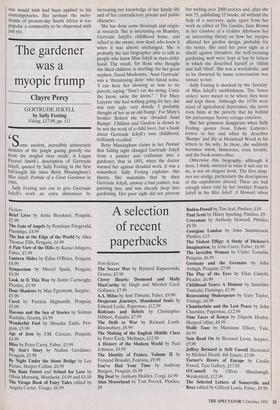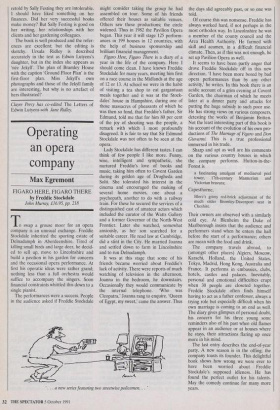The gardener was a myopic frump
Clayre Percy
GERTRUDE JEKYLL by Sally Festing Viking, £17.99, pp. 311 Some ancient, incredibly aristocratic denizen of the jungle gazing gravely out from the tangled river reeds', is Logan Pearsal Smith's description of Gertrude Jekyll, quoted by Sally Festing in the first full-length life since Betty Massingham's Aliss Jekyll: Portrait of a Great Gardener in 1966.
Sally Festing sets out to give Gertrude Jekyll's work an extra dimension by increasing our knowledge of her family life and of her contradictory private and public character.
She has done some thorough and origin- al research. She is interesting on Bramley, Gertrude Jekyll's childhood home, and talked to the owner, now dead, who knew it when it was almost unchanged. She is probably the last biographer able to talk to people who knew Miss Jekyll in their child- hood. The result, for those who thought she liked children, is startling: for her great nephew, David Mackenna, 'Aunt Gertrude' was a 'threatening deity' who hated noise. 'I can hear her showing us how to tie parcels, saying "Don't cut the string. Untie the knots, untie the knots." ' For Mary Lutyens 'she had nothing going for her, she was very ugly, very dowdy. I probably thought of her as an old frump.' For Mary's brother Robert she was 'dreaded Aunt Bumps'. Children and Gardens is shown to be not the work of a child lover, but a book about Gertrude Jekyll's own childhood, brilliantly recalled. Betty Massingham claims in her Portrait that failing sight changed Gertrude Jekyll from a painter and craftsman into a gardener; that in 1891, when the doctor warned her against detailed work, it was a watershed. Sally Festing explodes this theory. She maintains that by then Gertrude Jekyll, anyway a bad painter, was painting less, and was already deep into gardening. Her poor sight did not prevent her writing over 2000 articles and, after she was 55, publishing 15 books, all without the help of a secretary, quite apart from her work as editor of The Garden. Jane Brown in her Gardens of a Golden Afternoon has an interesting theory on how her myopia affected her garden design, probably for the better. She used her poor sight as a shield against intruders; the well-meaning gardening mob were kept at bay by letters in which she described herself as 'oldish and half blind'. She was a workaholic, and to be thwarted by inane conversation was torture to her.
Sally Festing is shocked by the 'ferocity' of Miss Jekyll's snobbishness. The `lower orders' were meant to be where they were and kept there. Although the 1870s were years of agricultural depression, she never even hints at the poverty that lay behind the picturesque Surrey cottage exteriors.
But her grimness disappears when Sally Festing quotes from Edwin Lutyens's letters to her and when he describes 'Bumps' and life at Munstead Wood in his letters to his wife. In these, she suddenly becomes warm, humorous, even lovable, and the book comes alive.
Otherwise this biography, although it does, I think, succeed in what it sets out to do, is not an elegant work. The first chap- ters are stodgy, particularly the descriptions of the expeditions abroad. These are bad enough when told by her brother Francis Jekyll in his Miss Jekyll: A Memoir; when
retold by Sally Festing they are intolerable. I should have liked something on her finances. Did her very successful books make money? But Sally Festing is good on her writing, her relationships with her clients and her gardening colleagues.
The book is well produced and the refer- ences are excellent; but the editing is sketchy. Ursula Ridley is described accurately in the text as Edwin Lutyens's daughter, but in the index she appears as `née Jekyll'. The plan of Bramley House with the caption 'Ground Floor Plan' is the first-floor plan. Miss Jekyll's own photographs and those of the Jekyll family are interesting, but why is no artefact of hers illustrated?
Clayre Percy has co-edited The Letters of Edwin Lutyens with Jane Ridley.



















































 Previous page
Previous page